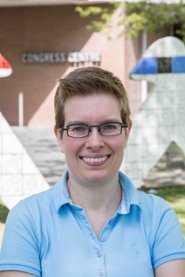How can humans and computers learn from data? To research this, scientists often use so-called Bayesian methods. Although these methods are widely used, they also have limitations and are not always easy to interpret. In her dissertation Rianne de Heide describes some of these problems and introduces a new way of hypothesis testing. For this she received the Willem R. van Zwet Award. De Heide did her PhD research for Leiden University at CWI. After her PhD defence she first became a researcher at CWI and currently she is working at VU Amsterdam.

Rianne de Heide: "In my dissertation 'Bayesian Learning: Challenges, Limitations and Pragmatics' I investigate some problems of Bayesian methods used to learn from data. These methods are widely used in statistics and machine learning, but they also have their limitations. I describe what can and cannot be done and support this with mathematical proofs."
Jury: 'A pleasure to read'
For her dissertation, De Heide received the Willem R. van Zwet Prize. The jury was impressed by the writing style and found the dissertation very innovative, both conceptually and in terms of mathematical theory. "It captivates the reader and moves easily from the conceptual to the technical, and from the practical to the philosophical," said the jury in their report. "It was a real pleasure to read."
The jury particularly mentioned the chapter introducing a new way of hypothesis testing with e-values. De Heide receives 1000 euros as a prize and recognition for her hard work. 'I am very thankful for this award. It is very nice to receive such a recognition for my work. I would also like to thank my (co-)promotores Jacqueline Meulman, Peter Grünwald and Wouter Koolen once more. They always supported me, yet gave me complete freedom to pursue my own research interests.'
Want to know more?
Read the full dissertation on the Scholarly Publications Website of Leiden University.
The Willem R. van Zwet Prize is awarded annually by Netherlands Society for Statistics and Operations Research (VVSOR in Dutch) to on an excellent PhD in statistics or operations research. The aim of the VVSOR is to promote the application and study of statistics and operations research for the benefit of science and society.
Source: news item on Rianne's research at Leiden University
Header image: Shutterstock.
